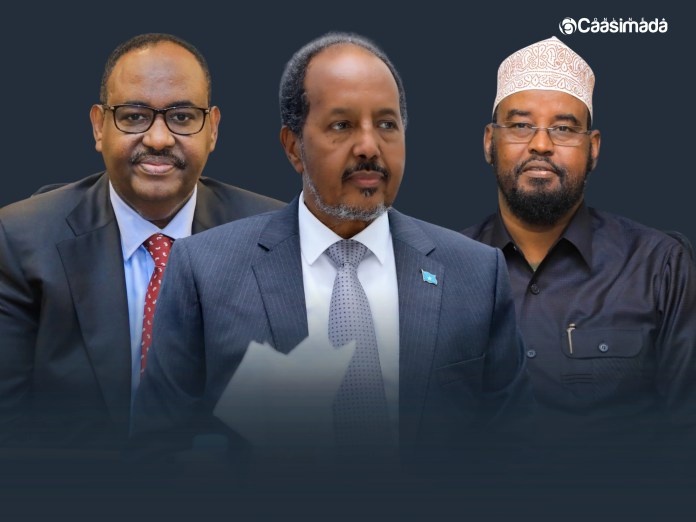NAIROBI, Kenya – The presidents of Somalia’s Puntland and Jubaland states have held a series of private meetings in Nairobi as they attempt to coordinate their positions in fraught negotiations with the federal government, political sources said.
Said Abdullahi Deni of Puntland and Ahmed Mohamed Islam, widely known as Madobe, met for several days amid rising tensions between Villa Somalia and federal member states. Their talks focused on finding a joint strategy for engagement with President Hassan Sheikh Mohamud, following months of mutual recriminations and political deadlock.
The meetings were partly triggered by reports that Madobe had already opened direct talks with the president, prompting Deni to seek assurances of coordination before any separate deals were struck.
After multiple sessions, the two leaders agreed that prolonged confrontation with Mogadishu had brought little benefit, and that a unified approach would strengthen their ability to influence national decisions.
They resolved to work together on significant issues such as constitutional amendments and the national electoral framework, while continuing to manage their own internal affairs independently. Both expressed concern that the federal government could exploit divisions among regional administrations to advance its own agenda.
“The lesson of recent years is that isolation achieves nothing. Acting together is the only way to protect regional interests,” said one source close to the talks.
Rift over the PM
Despite this consensus, differences remain over the future of Prime Minister Hamza Abdi Barre. Deni, who initially opposed Hamza’s appointment, has since shifted course, preferring to let him serve out his term. He is said to be prioritizing long-term institutional reforms and Puntland’s autonomy over short-term political maneuvering.
Madobe, by contrast, sees Hamza as a major obstacle to rebuilding trust. He has told allies that no genuine reset with Villa Somalia can occur while the prime minister remains in office, insisting that his dismissal is a necessary step before broader reconciliation can occur.
This split highlights the competing calculations of the two regional leaders as they begin to position themselves for Somalia’s post-2026 political order.
In parallel, Madobe has continued direct discussions with President Hassan Sheikh. According to officials in Kismayo, the Jubaland leader is prepared to accept nearly all of Mogadishu’s conditions except one: any move to shorten his current mandate.
He is pressing for a formal written statement from Villa Somalia affirming his electoral legitimacy, which he considers essential for progress. “If they respect our position, we can move forward. If not, everything collapses,” one Jubaland insider said.
Bitter history
The rivalry between Madobe and the federal leadership has become one of Somalia’s most entrenched disputes. The feud dates back to November 2024, when Jubaland re-elected Madobe for a third term in polls that Mogadishu declared illegitimate.
The federal government responded with an arrest warrant for the Jubaland president, accusing him of undermining the constitutional order. In retaliation, Jubaland issued its own warrant for President Hassan Sheikh and announced it would sever ties with Mogadishu altogether.
Since then, relations have remained frozen, with both administrations refusing to recognize each other’s authority. International mediation has yielded little progress, leaving the standoff to fester through 2025.
By aligning with Puntland, Madobe appears to be seeking more substantial leverage in talks with the federal government. The two states have pledged to support each other in any agreements reached with Villa Somalia and to hold the federal authorities accountable for fulfilling their commitments.
Whether this newfound cooperation can overcome lingering mistrust – and the dispute over the prime minister – will determine if Somalia’s fragile federal system can move toward reconciliation, or slide further into political gridlock.


